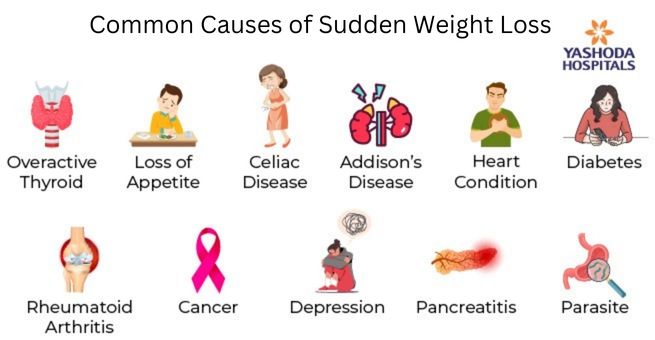Experiencing sudden weight loss can be startling and unsettling. Unlike gradual weight loss, sudden weight loss occurs rapidly and without an obvious cause. This unexpected change in body weight can be a sign of underlying health issues that require attention. In this comprehensive guide, we’ll explore what constitutes sudden weight loss, its various causes, how to diagnose it, and effective ways to manage and prevent it.
Identifying Sudden Weight Loss
Identifying sudden weight loss involves recognising the speed and extent of weight change. Noticing unexplained appetite changes, fatigue, or physical alterations can help pinpoint if the weight loss is sudden and requires medical attention.
What is Considered ‘Sudden’?
Sudden weight loss is typically defined as a significant reduction in body weight that occurs over a short period. Specifically, losing more than 5% of your body weight within 6 months, without a known reason, is considered sudden. For example, if you weigh 80kg and lose more than 4kg in a short time, this would be regarded as sudden weight loss.
Symptoms to Watch For
Recognising the signs of sudden weight loss is crucial. Common symptoms include:
- Unexplained Loss of Appetite: A noticeable decrease in your desire to eat, leading to reduced food intake.
- Persistent Fatigue: Feeling unusually tired or weak, despite adequate rest.
- Visible Physical Changes: Noticeable changes in body shape or size, including loose clothing or sagging skin.
If you notice any of these symptoms alongside rapid weight loss, it’s important to consult a healthcare professional for further evaluation.
Common Causes of Sudden Weight Loss

Understanding the common causes of sudden weight loss is essential for effective diagnosis and treatment. These causes can range from medical conditions and mental health issues to the side effects of medications, each requiring a different approach for management and care.
Medical Conditions
Medical conditions can be significant contributors to sudden weight loss, often resulting from changes in metabolism or nutrient absorption. Identifying and treating these conditions is crucial for addressing the underlying cause of the weight loss.
Hyperthyroidism
Hyperthyroidism, an overactive thyroid gland, results in the production of excess thyroid hormones. This condition accelerates metabolism, leading to rapid weight loss. Symptoms of hyperthyroidism include unexplained weight loss, increased appetite, and a racing heartbeat. Treatment options often involve antithyroid medications, radioactive iodine, or surgery.
Diabetes
Diabetes, particularly when poorly controlled, can cause significant weight loss. In diabetes, high blood sugar levels lead the body to break down fat and muscle for energy. This weight loss is often accompanied by symptoms such as frequent urination, excessive thirst, and fatigue. Proper management with insulin or other medications can help stabilise weight.
Cancer
Cancer can lead to weight loss through various mechanisms, such as metabolic changes, reduced appetite, or increased energy expenditure. Common cancers associated with weight loss include pancreatic cancer and stomach cancer. Early diagnosis and treatment are critical in managing weight loss caused by cancer.
Gastrointestinal Disorders
Gastrointestinal disorders, such as Crohn’s disease or peptic ulcers, can interfere with the body’s ability to absorb nutrients. This malabsorption can result in weight loss, along with symptoms like abdominal pain, diarrhoea, and nausea. Treatment often involves medication, dietary changes, and, in some cases, surgery.
Mental Health Issues
Mental health issues can profoundly impact your eating habits and overall weight. Conditions such as depression and anxiety often lead to significant weight loss, highlighting the need for comprehensive mental and physical health support.
Depression and Anxiety
Mental health conditions like depression and anxiety can significantly impact eating habits and weight. Depression may lead to loss of appetite, while anxiety can cause gastrointestinal issues that affect eating. Addressing these conditions with therapy and medication can help improve both mental health and weight.
Eating Disorders
Eating disorders, such as anorexia nervosa and bulimia nervosa, are characterised by extreme eating behaviours and attitudes towards food. These disorders lead to severe weight loss due to restricted eating, excessive exercise, or purging. Treatment typically includes psychological therapy, nutritional counselling, and support groups.
Medications and Treatments
Certain medications and treatments can lead to unexpected weight loss as a side effect. Identifying and adjusting these treatments with the help of your healthcare provider can help manage and mitigate weight loss.
Side Effects
Certain medications can have weight loss as a side effect. For instance, medications for high blood pressure, some antibiotics, and medications for depression may lead to decreased appetite and subsequent weight loss. If you experience sudden weight loss after starting a new medication, discuss it with your doctor, who may adjust your prescription.
Chemotherapy
Chemotherapy is a common treatment for cancer that can lead to weight loss. This is due to side effects like nausea, loss of appetite, and changes in taste. Managing these side effects with anti-nausea medication, dietary adjustments, and nutritional supplements can help maintain weight during treatment.
Diagnosing Sudden Weight Loss
Diagnosing sudden weight loss involves a thorough evaluation to uncover its cause. This process includes medical consultations, physical exams, and relevant tests to identify any underlying health issues.
Medical Evaluation
A thorough medical evaluation is essential to diagnose the cause of sudden weight loss. This process involves:
- Consultation with Healthcare Providers: Discussing your symptoms, medical history, and recent changes in weight with your doctor.
- Physical Examination: Your doctor will conduct a physical examination to check for any visible signs of illness or abnormalities.
- Diagnostic Tests: Tests such as blood tests, imaging scans (like X-rays or MRIs), and endoscopies may be required to identify the underlying cause of weight loss.
Self-Monitoring
Keeping track of your weight and any related symptoms is crucial for diagnosing sudden weight loss. Maintain a detailed record of:
- Dietary Changes: Note any changes in your eating habits or food preferences.
- Physical Activity: Track your exercise routine and any unusual physical activities.
- Health Changes: Record any new symptoms or changes in your overall health.
Monitoring these factors can provide valuable insights and assist your healthcare provider in diagnosing the issue.
Treatment and Management
Effective treatment and management of sudden weight loss focus on addressing the root cause and supporting overall health. This often involves a combination of medical interventions, dietary adjustments, and lifestyle changes tailored to individual needs.
Medical Interventions
Medical interventions are crucial for addressing the underlying conditions causing sudden weight loss. Tailoring treatment plans to the specific cause—whether through medication, surgery, or other therapies—can help stabilise weight and improve health outcomes.
Addressing Underlying Conditions
The primary approach to managing sudden weight loss involves treating the underlying condition. For instance:
- Hyperthyroidism: Treatment may include antithyroid drugs, radioactive iodine therapy, or surgery.
- Diabetes: Managing blood sugar levels through medication, lifestyle changes, and regular monitoring.
- Gastrointestinal Disorders: Medication, dietary modifications, and possibly surgical interventions.
Nutritional Support
To counteract weight loss, working with a nutritionist can be beneficial. They can help design a meal plan that:
- Includes High-Calorie, Nutrient-Dense Foods: Such as lean proteins, healthy fats, and whole grains.
- Offers Small, Frequent Meals: Eating smaller meals more often can help increase calorie intake and improve nutrient absorption.
Lifestyle Adjustments
Making lifestyle adjustments can play a significant role in managing sudden weight loss. Incorporating dietary changes and regular exercise helps support weight gain and overall health, complementing medical treatments effectively.
Dietary Changes
Making changes to your diet can help manage sudden weight loss:
- Increase Caloric Intake: Incorporate foods that are rich in calories and nutrients.
- Balanced Meals: Focus on a balanced diet with proteins, fats, and carbohydrates.
- Snacking: Regular, healthy snacks can help meet daily calorie needs.
Exercise and Physical Therapy
Engaging in appropriate physical activity can help maintain muscle mass and overall health:
- Gentle Exercise: Activities like walking or swimming can be beneficial.
- Strength Training: Incorporating light strength training exercises can help build muscle and maintain weight.
Always consult with a healthcare provider before starting a new exercise regimen to ensure it’s safe for your condition.
Mental Health Support
Addressing mental health is crucial when dealing with sudden weight loss linked to psychological factors. Therapy and counselling can help manage underlying conditions, improve eating habits, and support overall well-being.
Therapies and Counselling
If mental health issues are contributing to weight loss, seeking professional help is crucial:
- Therapy: Cognitive behavioural therapy (CBT) and other therapeutic approaches can help address eating behaviours and emotional issues.
- Counselling: Working with a counsellor can support mental well-being and improve overall health.
When to Seek Help
It’s important to seek help if sudden weight loss is accompanied by severe symptoms or significant changes in health. Early intervention can prevent complications and ensure timely treatment for any underlying issues.
Warning Signs
Warning signs that warrant immediate medical attention include extreme fatigue, persistent pain, or rapid, unexplained weight loss. These symptoms may indicate serious underlying conditions that require urgent evaluation and care.
Seek medical attention if you experience:
- Severe Symptoms: Such as extreme fatigue, persistent pain, or drastic changes in weight.
- Prolonged Issues: Ongoing weight loss without a clear cause requires prompt evaluation by a healthcare professional.
Resources for Support
Finding the right resources for support can significantly aid in managing sudden weight loss. Accessing healthcare professionals, support groups, and educational materials can provide the necessary guidance and assistance for effective treatment and recovery.
Finding the right support is essential:
- Healthcare Professionals: Look for specialists in weight management or specific conditions related to your symptoms.
- Support Groups: Joining support groups can provide additional resources and emotional support from others experiencing similar issues.
Preventive Measures
Preventive measures can help minimise the risk of sudden weight loss by promoting overall health and wellness. Maintaining a balanced diet, managing stress, and regular health check-ups can all contribute to preventing unexpected weight changes.
Healthy Lifestyle Choices
Adopting healthy lifestyle choices is key to preventing sudden weight loss and maintaining overall well-being. Regular balanced meals, consistent physical activity, and managing stress can help support a stable weight and overall health.
Maintaining a healthy lifestyle can help prevent sudden weight loss:
- Balanced Diet: Regularly eat a varied diet rich in essential nutrients.
- Regular Exercise: Engage in consistent physical activity suited to your health needs.
Routine Check-ups
Routine check-ups are essential for early detection and prevention of potential health issues that could lead to sudden weight loss. Regular visits to your healthcare provider ensure that any emerging conditions are addressed promptly and effectively.
Regular health screenings can help detect issues early:
- Health Screenings: Schedule routine check-ups to monitor overall health and address potential issues before they become serious.
Conclusion
Sudden weight loss can be a sign of various underlying health conditions. Understanding its causes, recognising symptoms, and seeking appropriate medical help are key steps in managing this issue. By addressing the root cause, making necessary lifestyle adjustments, and monitoring your health, you can effectively manage and potentially prevent sudden weight loss. If you experience unexplained weight loss, consult with a healthcare provider to ensure your well-being and receive the necessary care.
For more information on sudden weight loss and related conditions, consider exploring the following resources:
- Links to Relevant Articles: Detailed articles on specific causes and treatments.
- Contact Information for Specialists: Find professionals who can provide further assistance and support.
This guide aims to provide a thorough understanding of sudden weight loss, offering practical advice and insights for managing this significant health concern.

